In November, voters rejected a permanent 5.9-mill additional tax levy by a nearly 57-to-43 ratio. Under that levy, 5.4 mills would have paid for day-to-day operating expenses for the district, and 0.5 mills would have gone to permanent improvements for long-term assets (facilities, buses, etc.).
Centerville’s Board of Education voted 4-1 Monday to approve a resolution putting the smaller March levy on the ballot. The levy, if approved, would cost a homeowner $139 for each $100,000 of appraised value, per the county auditor’s office.
School board member John Doll said the 3.9-mill levy is “the best option that we have for our staff, our district and for our community.”
“We know we need to get more information out about how levies even work, because there’s a lot of misunderstanding about how that works,” Doll said. “It gives us an opportunity to convince our community that it’s in everyone’s best interest that this levy passes.”
Allison Durnbaugh, the school board’s vice president, voted against the levy. She said she would have preferred two other options presented to the board “because I think the need is there and I think the community by and large recognizes that the need is there, but we need to meet them halfway.”
“I don’t think anybody wants to see reductions from our staff and ... we need our excellent staff to run and create a good product‚ which is what we’re all up here for and we’re all up here because we love the district,” Durnbaugh said during Monday’s meeting. “Nobody wants to see (staffing reductions) happen. I’m concerned that if we don’t get it right in March, it’s going to be bad and we’re going to further the divisions in the community.”
Additional funds generated by the levy would be used by Centerville Schools for day-to-day operating expenses, including maintaining educational programs that meet the learning needs of all students, meeting health and wellness needs to help students develop the skills necessary for learning and expanding college and career pathways.
Funding also would be used to provide co-curricular and extracurricular activities, to recruit and retain high-quality teachers and support staff during a period of teacher and labor shortages, and to support facility maintenance and renovation projects. In all Ohio school districts, a majority of school expenditures pay for staff wages and benefits.
Centerville school district voters last approved a levy for additional funding in November 2019.
The decision to proceed with placing a levy on the March ballot was made after several weeks of discussion about district finances at board meetings, as well as input from staff and community members via three community forums.
School board President Dr. David Roer said board members “have carefully studied our financial projections” and listened to community feedback.
“Because of the way public school districts are funded in Ohio, the need for additional funding does not go away,” Superintendent Jon Wesney said in a statement. “Our expenses are continuing to outpace our revenue, which has led us to ask the community for additional funding and find ways to make reductions in all areas of our operation.”
Wesney said the district has already implemented several immediate reductions, including limiting new hires, substitutes for support staff, and overtime, in addition to reducing costs for classroom resources, such as field trips and paper.
However, the district noted that “it is difficult to make a large impact to the budget in the middle of the school year.”
Roer said district officials will continue to meet with community members and “take a hard look” at additional possibilities. Those reductions are set to be presented to the school board in January.
About the Author
